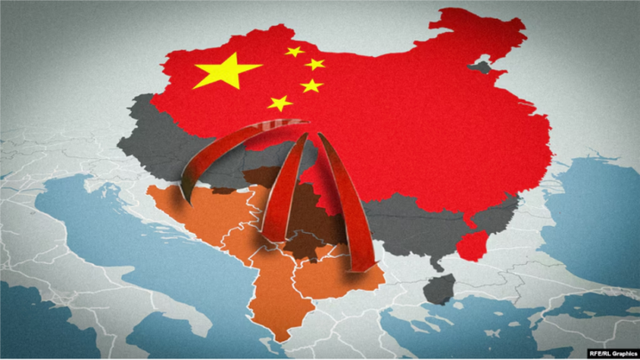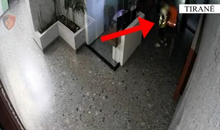
 Flash News
Flash News
Three cars collide in Tirana, one of them catches fire
He abused his minor daughter, this is a 36-year-old man in custody in Fier
Serious in Fier! Father sexually abuses his minor daughter
The phone found in prison is expected to be disassembled, Laert Haxhiu risks isolation in '41 biss'
24 thousand bullets from Albania to Crete: How was the criminal network destroyed by the Greek police?
Analysis: How is China exploiting the West's retreat to expand its presence in the Western Balkans?

China is strengthening its influence in the Western Balkans through economic power, infrastructure projects and increasingly through cultural and media influence, according to an analysis by the Digital Forensics Center (DFC) from Podgorica, published on June 3.
According to the analysis - a project funded by the US Embassy in Podgorica - Beijing is taking advantage of the attraction of Western partners to increase its presence in the region through investments in infrastructure, media and culture. Infrastructure projects, according to the analysis, are the main channel for Chinese entry into the region, often accompanied by non-transparent procedures and the risk of corruption.
"Lower prices compared to American and European competitors are enabling Chinese companies to secure cooperation with countries in the region. In this context, the Western Balkans serve as a springboard and bridge for the expansion of Chinese investments into Europe," said DFC analyst Marko Banovic.
Globally, China – although formally neutral in the war in Ukraine – supports Russia. “This way it manages to maintain a strategic partnership with Moscow, while at the same time protecting its own economic interests in Europe,” Banovic estimates. Through initiatives such as the “Belt and Road” and its engagement in BRICS, China is aiming to lay the foundations of a new international order in which its political and economic model plays a central role.
The DFC analysis highlights that Serbia is one of the key points of Chinese influence in Europe. Relations have strengthened especially after the Serbian Progressive Party and Aleksandar Vučić came to power. Since 2024, China has become Serbia's main political and economic ally, according to Banović.
In the first half of 2024, China was the second largest investor in Serbia, after the EU, with about a third of direct investments. There are 1,560 companies with Chinese capital operating in Serbia, employing about 20,600 people. China is Serbia's largest trading partner, with an exchange of 5.7 billion euros - of which 5.13 billion are imports.
The free trade agreement from July 2024 includes over 20,000 products, of which 90 percent will be exempt from customs duties. From 2012 to 2021, at least 61 projects worth a total of 18.7 billion euros have been identified, implemented by Chinese companies. The Chinese Exim Bank has provided loans worth 5.7 billion euros, while Chinese companies have directly invested about 2 billion. Politically, China does not recognize Kosovo's independence, while Serbia supports the "one China" policy.
"Chinese influence is promoted as a win-win model for both sides, without political conditions – unlike the EU, which insists on the rule of law and reform," Banovic points out.
Ndikimi kinez pasqyrohet edhe në ndryshimet ligjore – përfshirë Ligjin e Punës dhe ligjin për procedura të veçanta – të cilat janë përshtatur për të favorizuar investitorët kinezë. Kina i ka shitur Serbisë dronë dhe sistemin antiajror FK-3, duke e zgjeruar tregun e saj të armëve përtej kufijve tradicionalë. Ndërmjet Kosovës dhe Kinës nuk ekzistojnë marrëdhënie diplomatike formale, por ndikimi kinez nuk është krejtësisht i munguar – megjithëse mbetet shumë i kufizuar.
Kina nuk e njeh pavarësinë e Kosovës të shpallur më 2008 dhe e mbështet integritetin territorial të Serbisë, duke e parë Kosovën në prizmin e çështjeve të veta të brendshme, si Tajvani dhe Tibeti. Kina ka penguar anëtarësimin e Kosovës në organizata ndërkombëtare si UNESCO dhe INTERPOL. Ajo nuk ka ambasadë në Prishtinë, por vepron përmes Zyrës Ndërlidhëse në kuadër të ambasadës së saj në Beograd.
Megjithatë, tregtia mes dy vendeve po rritet. Në vitin 2023, Kosova importoi nga Kina mallra me vlerë 650 milionë euro, ndërsa eksportoi vetëm 442 mijë euro. Kryesisht bëhet fjalë për pajisje teknologjike, përfshirë sisteme mbikëqyrjeje të kompanive Dahua dhe Hikvision – të cilat janë nën sanksione në vendet perëndimore për arsye sigurie. Investimet kineze në Kosovë janë pothuajse të papërfillshme. Kina përmendet rrallë në media dhe shpesh në mënyrë neutrale ose negative, me theks të madh te partneriteti me BE-në dhe SHBA-në.
Sipas një sondazhi të DFC-së, 69 për qind e qytetarëve të Kosovës nuk besojnë se lidhjet e forta me Kinën do të përmirësonin interesat e vendit – duke reflektuar orientimin e thellë pro-perëndimor të shoqërisë kosovare. Kina dhe Mali i Zi kanë marrëdhënie të mira politike, si në nivel dypalësh ashtu edhe përmes iniciativës “Brezi dhe Rruga”. Ndryshe nga Rusia, Pekini nuk përzihet drejtpërdrejt në politikën e brendshme të Malit të Zi dhe madje ka mbështetur anëtarësimin e vendit në BE.
Ndryshe nga BE-ja që përqendrohet në reforma ligjore e institucionale, angazhimi kinez reflektohet përmes bashkëpunimit me institucione konkrete, investimeve në infrastrukturë dhe financa. Kjo përfshin vizita zyrtare, shkëmbime studimore dhe pjesëmarrje të kompanive kineze në tregun malazez.
Kina ende nuk është investitori më i madh në Mal të Zi, por ka rol të rëndësishëm si kreditor dhe kontraktues. Shembulli më i madh është kredia prej afro një miliard dollarësh që Qeveria malazeze mori nga banka Exim për ndërtimin e autostradës Bar–Boljare, projekt i kompanisë kineze CRBC.
Kina është gjithashtu e përfshirë në projekte si rikonstruksioni ekologjik i Termocentralit të Plevlës. Por, shumë prej këtyre projekteve janë jotransparente dhe kanë ndikim negativ në mjedis. Ndikimi i Pekinit në Mal të Zi nuk është vetëm ekonomik – përmes programeve kulturore dhe arsimore, shkëmbimit të studentëve dhe përmbajtjeve mediatike që promovojnë perspektivën kineze. Kina po ndërton ndikim të butë që ndikon diskursin publik dhe orientimin politik.
According to a DFC survey from May 2024, 33.8 percent of citizens believe that China has a great influence in Montenegro, and 63.2 percent assess it as positive. Chinese influence in Bosnia and Herzegovina is most visible in the Republika Srpska entity, through trade, education, media and diplomacy. Although cooperation is presented as economic and cultural, the analysis estimates that it has an increasingly political content.
In 2023, the Chinese government's special envoy for European affairs, Wu Hongbo, visited the country, focusing on cooperation within the framework of the "Belt and Road" initiative and European security. In November of the same year, the president of Republika Srpska, Milorad Dodik, met with the Chinese ambassador, Yi Ping, to discuss the political situation and the Dayton Agreement, which was interpreted as direct Chinese involvement in Bosnia's internal affairs.
In 2021, China and Russia attempted through the United Nations to close the Office of the High Representative (OHR), but the resolution failed. In North Macedonia, Chinese influence comes through trade, education, media, and diplomacy. Although the relationship is presented as mutually beneficial, analysis raises concerns about potential negative influence that could undermine sovereignty and democratic processes.
China has strongly criticized the visit of Macedonian lawmakers to Taiwan, while the development projects it offers often contain hidden clauses, such as the possibility of demanding immediate repayment of loans if Chinese interests are violated. Currently, North Macedonia owes China $479 million - which accounts for 8.7 percent of the country's external debt. Trade exchange in 2024 was about $490 million, with a large deficit on the Macedonian side.
The Confucius Institute in Skopje is the main instrument of Chinese cultural and educational influence. The number of trainees has increased from 60 in 2013 to 562. Half of the books translated from Chinese are for children – an indication of the focus on the younger generation. North Macedonia has carried out more scientific projects with China than with any other country./ REL
Latest news


Three cars collide in Tirana, one of them catches fire
2025-07-01 15:38:16

Shehu: Whoever doesn't want Berisha, doesn't want the opposition 'war'!
2025-07-01 15:19:20
Berisha requests the OSCE Assembly: Help my nation vote freely
2025-07-01 15:11:46
Be careful with medications: Some of them can harm your sex life
2025-07-01 15:00:32

'Golden Bullet'/ Lawyers leave the courtroom, Altin Ndoc's trial postponed again
2025-07-01 14:44:52
EU changes leadership, Kosovo in a number of places
2025-07-01 14:40:01
Should we drink a lot of water? Experts are surprised: You risk hyponatremia
2025-07-01 14:30:20



Lëpusha beyond Rama's postcards: A village that is being silently abandoned
2025-07-01 13:41:56
Scorching temperatures in France close the Eiffel Tower
2025-07-01 13:29:35
Media: China, Iran and North Korea, a threat to European security
2025-07-01 13:20:12
Albania drops in global index: Less calm, more insecure
2025-07-01 13:09:35
Road collapses, 5 villages in Martanesh risk being isolated
2025-07-01 13:03:04

Këlliçi: Opposition action to be decided in September
2025-07-01 12:48:49
Four tips for coping with the heat wave
2025-07-01 12:38:53
Car hits pedestrian on Transbalkan road
2025-07-01 12:27:09
Authors of 9 robberies, Erjon Sopoti and Abdullah Zyberi arrested
2025-07-01 12:15:56

He abused his minor daughter, this is a 36-year-old man in custody in Fier
2025-07-01 11:50:34
The constitution of the Kosovo Assembly fails for the 40th time
2025-07-01 11:40:08




EU confirms support for the Western Balkans
2025-07-01 10:50:45
Serious in Fier! Father sexually abuses his minor daughter
2025-07-01 10:32:33
One year since the passing of the colossus of Albanian literature, Ismail Kadare
2025-07-01 10:25:26


They supplied the 'spaçators' with drugs, two young men are arrested in Tirana
2025-07-01 09:54:09
Europe is "scorching", how dangerous are high temperatures?
2025-07-01 09:48:56


Nigel Farage in Albania: but why?
2025-07-01 09:13:12
Xama: The "Partizani" dossier is quite weak and without facts!
2025-07-01 09:04:47

Foreign exchange, the rate at which foreign currencies are sold and bought
2025-07-01 08:35:39
Fabricators again warn of factory closures and job cuts
2025-07-01 08:21:30
Horoscope, what do the stars have in store for you today?
2025-07-01 08:08:59
Scorching hot, temperatures reaching 40°C
2025-07-01 07:57:12
Morning Post/ In 2 lines: What mattered yesterday in Albania
2025-07-01 07:42:59
Recount after May 11, Braho: I had no expectations for massive vote trafficking
2025-06-30 22:54:18

Second hearing on the protected areas law, Zhupa: Unconstitutional and dangerous
2025-06-30 22:18:46



Israel-Iran conflict, Bushati: Albanians should be concerned
2025-06-30 21:32:42

Fuga: Journalism in Albania today in severe crisis
2025-06-30 21:07:11
"There is no room for panic"/ Moore: Serbia does not dare to attack Kosovo!
2025-06-30 20:49:53

Temperatures above 40 degrees, France closes nuclear plants and schools
2025-06-30 20:28:42
Lavrov: NATO is risking self-destruction with new military budget
2025-06-30 20:13:54
Turkey against the "Bektashi state" in Albania: Give up this idea!
2025-06-30 20:03:24

Accused of sexual abuse, producer Diddy awaits court decision
2025-06-30 19:40:44



Kurti and Vučić "face off" tomorrow in Skopje
2025-06-30 18:44:12
Tourism: new season, old problems
2025-06-30 18:27:23


Construction worker dies after falling from scaffolding in Berat
2025-06-30 17:51:44




Almost free housing: East Germany against depopulation
2025-06-30 16:43:06

Hamas says nearly 60 people killed in Gaza as Trump calls for ceasefire
2025-06-30 16:14:15
Drownings on beaches/ Expert Softa: Negligence and incompetence by institutions!
2025-06-30 16:00:03


European ports are overloaded due to Trump tariffs
2025-06-30 15:30:44
The prosecution sends two Korça Municipality officials to trial
2025-06-30 15:19:54

Lezha/ Police impose 3165 administrative measures, handcuff 19 drivers
2025-06-30 14:55:04
Young people leave Albania in search of a more sustainable future
2025-06-30 14:47:52
Record-breaking summer, health threats and preventive measures
2025-06-30 14:36:19


Constitution of the Parliament, Osmani invites political leaders to a meeting
2025-06-30 14:07:54

Heat wave 'invades' Europe, Spain records temperatures up to 46 degrees Celsius
2025-06-30 13:42:02
Accident in Vlora, car hits 2 tourists
2025-06-30 13:32:16

Kurti confirms participation in today's official dinner in Skopje
2025-06-30 13:03:27

Fight between 4 minors in Kosovo, one of them injured with a knife
2025-06-30 12:38:45

Report: Teenage girls the loneliest in the world
2025-06-30 12:20:40
